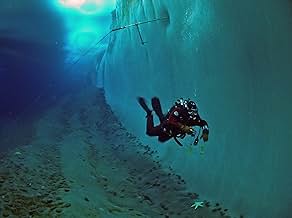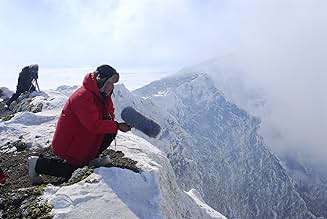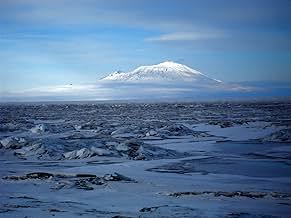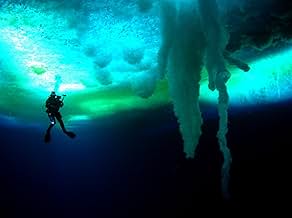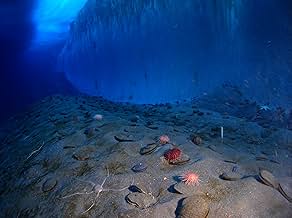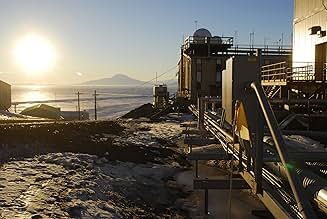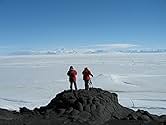CALIFICACIÓN DE IMDb
7.7/10
20 k
TU CALIFICACIÓN
Documental que retrata la vida cotidiana de los miembros de una comunidad científica en la Antártida.Documental que retrata la vida cotidiana de los miembros de una comunidad científica en la Antártida.Documental que retrata la vida cotidiana de los miembros de una comunidad científica en la Antártida.
- Dirección
- Guionista
- Elenco
- Nominado a 1 premio Óscar
- 2 premios ganados y 16 nominaciones en total
Doug MacAyeal
- Self - Glaciologist
- (as Douglas MacAyeal)
Ryan Andrew Evans
- Self - Filmmaker, Cook
- (as Ryan A. Evans)
- Dirección
- Guionista
- Todo el elenco y el equipo
- Producción, taquilla y más en IMDbPro
Opiniones destacadas
The world ends at Antarctica, at least geographically - there's nothing further south - and quite possibly in a greater sense. Werner Herzog has gone there to make a film, catching the opportunity to capture some of it's beauty in a way rarely seen on film, and also to share some of his thoughts about nature and humanity. In and around the large McMurdo Research Station he circulates the various people working there, joins them on their fieldwork and interviews them, all resulting in a blend of beautiful images, personal micro-stories, funny sidetracks, well paced informative moments and an often fascinating look at nature's inexplicable mystery, humanity's as well as Mother Earth's.
This is a large canvas, perhaps slightly difficult to put in proper words. Above all, all of the ideas and thoughts within the movie stems largely from the viewer's own imagination, Herzog is merely - with his warm and serious, yet inexplicable witty, narration - planting the mental seeds and asking the questions, some rhetorical and some forever impossible to answer. And it is remarkable how he does this, how this film is designed. All throughout, Herzog moves about like a genuine tourist and at the beginning I am surprised how spontaneous the whole idea feels, almost as if I am actually watching a private home video made for personal remembrance. The only difference being of course, that it would be the kind of home video Herzog would make. And be that as it may, this is still a great movie, because it continues from this elementary first stage of how he travels to the station, combined with stock footage of the explorers of the 1800s, into that of a true thinker's exploration in a romantic setting. The form of the film gradually evolves, first small steps with the reality of the small, modern society that has been developed, the paradox of a restaurant with a beloved ice-cream machine (needless to point out further, and despised by Herzog), and with a scene of people having an unusual way of training, in case they would get lost in a blizzard. From then on, at least I was hooked and from these minor steps of humanity looking itself, if but slightly, in the mirror, the movie blossoms into a greater and greater abyss of questions that human beings will always feel the hunger to answer, questions they never will be able to answer but questions that human beings will always need to have.
Human beings, now there's another thing. Herzog encounters a lot of inhabitants of the station and gets to know them, and while not to say that there aren't interesting people throughout the movie, but here we have the adventurous woman who has her own party trick where she amuses people by becoming luggage. She has many stories to tell, like how she hitch-hiked from USA to Africa in a sewer pipe. Another man claims he once survived getting killed by the mayans . There are others with less dramatic things to say. Like one of the biologist divers, slightly sad since he's decided that at that very day he will perform his last dive. He feels like his job is done. Another man is simply showing how he has two fingers of the same length, which would prove that he's got Aztec blood in his veins. Or so they say.
You might understand what I'm getting at. In these very sequences of utter realism, we do get to feel the fresh air of a normal day out at the Antarctica. And it helps settle the notion that this is a film about humanity. We are constantly in the real world, with real people, in contrast to Grizzly Man (2005), Herzog's previous nature documentary, where we were indeed surrounded by breathtaking nature, but we were also viewing the Timothy Treadwell show, put on by the star persona of himself, if there ever were another. Here we meet the actual answer to Treadwell's love to nature. Science, philosophy, mere being in the never ending light over the ices. Herzog seems very much in love with nature, be it ice skies underneath the surface, or active, thundering volcanoes or just the remarkable penguin scene that could break your heart (even Herzog could not resist one of those sentimental scenes directed by nature, despite even claiming early on that this is "not a penguin film"). It may be penguins, but it's hauntingly beautiful nonetheless.
Throughout the movie, Herzog keeps expanding his view on nature and humanity until we reach the end, and the topic we've all been waiting for. The climate change. As you'd expect though Encounters at the End of the World is by no means a propaganda film, it would obviously be beneath Herzog's dignity. No, it seems like Herzog quietly accepts that mankind might be headed for doom - it's as natural as the deranged penguins leaving it's flock to never return - and instead asks what alien lifeforms might think of our remains if they would land to explore in thousands of years. Yes, the explorations goes on. And I think it is importance to remember that the end of the world is not the end of the world. Mother Earth will be alright. She has all the time in the universe. Makind however, we may be getting near the end. I can't help but feel, when I see the colossal, wide, arctic images and the spreading cancerstain of urbanism, that after all mankind has done, Mother Earth deserves to be left alone for a while. There has to be some peace and quiet in the Universe. If the aliens do land, and they do study our hideouts, and they do feel confused over finding a fish deep down in a tunnel in the Antarctica; I'd suggest they'd watch Encounters at the End of the World.
This is a large canvas, perhaps slightly difficult to put in proper words. Above all, all of the ideas and thoughts within the movie stems largely from the viewer's own imagination, Herzog is merely - with his warm and serious, yet inexplicable witty, narration - planting the mental seeds and asking the questions, some rhetorical and some forever impossible to answer. And it is remarkable how he does this, how this film is designed. All throughout, Herzog moves about like a genuine tourist and at the beginning I am surprised how spontaneous the whole idea feels, almost as if I am actually watching a private home video made for personal remembrance. The only difference being of course, that it would be the kind of home video Herzog would make. And be that as it may, this is still a great movie, because it continues from this elementary first stage of how he travels to the station, combined with stock footage of the explorers of the 1800s, into that of a true thinker's exploration in a romantic setting. The form of the film gradually evolves, first small steps with the reality of the small, modern society that has been developed, the paradox of a restaurant with a beloved ice-cream machine (needless to point out further, and despised by Herzog), and with a scene of people having an unusual way of training, in case they would get lost in a blizzard. From then on, at least I was hooked and from these minor steps of humanity looking itself, if but slightly, in the mirror, the movie blossoms into a greater and greater abyss of questions that human beings will always feel the hunger to answer, questions they never will be able to answer but questions that human beings will always need to have.
Human beings, now there's another thing. Herzog encounters a lot of inhabitants of the station and gets to know them, and while not to say that there aren't interesting people throughout the movie, but here we have the adventurous woman who has her own party trick where she amuses people by becoming luggage. She has many stories to tell, like how she hitch-hiked from USA to Africa in a sewer pipe. Another man claims he once survived getting killed by the mayans . There are others with less dramatic things to say. Like one of the biologist divers, slightly sad since he's decided that at that very day he will perform his last dive. He feels like his job is done. Another man is simply showing how he has two fingers of the same length, which would prove that he's got Aztec blood in his veins. Or so they say.
You might understand what I'm getting at. In these very sequences of utter realism, we do get to feel the fresh air of a normal day out at the Antarctica. And it helps settle the notion that this is a film about humanity. We are constantly in the real world, with real people, in contrast to Grizzly Man (2005), Herzog's previous nature documentary, where we were indeed surrounded by breathtaking nature, but we were also viewing the Timothy Treadwell show, put on by the star persona of himself, if there ever were another. Here we meet the actual answer to Treadwell's love to nature. Science, philosophy, mere being in the never ending light over the ices. Herzog seems very much in love with nature, be it ice skies underneath the surface, or active, thundering volcanoes or just the remarkable penguin scene that could break your heart (even Herzog could not resist one of those sentimental scenes directed by nature, despite even claiming early on that this is "not a penguin film"). It may be penguins, but it's hauntingly beautiful nonetheless.
Throughout the movie, Herzog keeps expanding his view on nature and humanity until we reach the end, and the topic we've all been waiting for. The climate change. As you'd expect though Encounters at the End of the World is by no means a propaganda film, it would obviously be beneath Herzog's dignity. No, it seems like Herzog quietly accepts that mankind might be headed for doom - it's as natural as the deranged penguins leaving it's flock to never return - and instead asks what alien lifeforms might think of our remains if they would land to explore in thousands of years. Yes, the explorations goes on. And I think it is importance to remember that the end of the world is not the end of the world. Mother Earth will be alright. She has all the time in the universe. Makind however, we may be getting near the end. I can't help but feel, when I see the colossal, wide, arctic images and the spreading cancerstain of urbanism, that after all mankind has done, Mother Earth deserves to be left alone for a while. There has to be some peace and quiet in the Universe. If the aliens do land, and they do study our hideouts, and they do feel confused over finding a fish deep down in a tunnel in the Antarctica; I'd suggest they'd watch Encounters at the End of the World.
My school recently sponsored a screening of this film with Werner Herzog himself in attendance. Herzog joked with the audience that part of his ambition to make this film was because he wanted to document the Antarctic without making "another movie about penguins." And although a portion of the movie DOES contain a segment about penguins, it plays a minor role in a film of many elements which compose a curious and beautiful documentary. It is a study of both Nature and Man: by turns breathtaking in its landscape (especially the underwater photography), at other times funny and serious, as Herzog interviews the motley crew of individuals who call Antarctica home for the greater part of the year. Herzog narrates the film with a tongue-in-cheek sense of humor, yet always maintains respect for the subjects he covers. While he quipped with us afterward that this is not your typical Discovery Channel fare, he said he hopes to broadcast this film sometime on Discovery early next year. If that is the case, it is not a documentary anyone should miss.
10xlr884
I had a chance to see Werner Herzog's latest documentary at the Telluride Film Festival, where it received great buzz and very high praise upon its debut. Herzog informed the audience that he was shown some footage taken by a photographer in Antarctica while doing post-production on Grizzly Man and he was immediately entranced by what he saw. From this he was compelled to visit the continent and shoot some footage of his own, which became Encounters at the End of the World.
The film perfectly balances both gorgeous footage of the continent as well as fascinating interviews and anecdotes of the many researchers and workers of the McMurdo research station. There are many humorous moments, such as a scene in which visitors must go through a follow-the-leader type exercise before being allowed to venture out into the wild. Participants in the exercise must wear buckets adorned with ridiculous caricatures over their heads in order to simulate a whiteout. They must then try to follow each other as a group and find a researcher a distance away. Herzog simply observes as the participants fail over and over to find the researcher, which left the audience laughing for minutes on end. Another excellent scene has Herzog interviewing an expert on penguins, who goes into some of their more bizarre behavior, such when penguins go insane. In both cases, Herzog features striking footage and amusing interviews and narration.
The film fits in well with Herzog's already substantial canon. It is a beautiful look at a beautiful continent populated by a forklift driver with a PhD, a woman who once traveled to South America in a sewage pipe on the back of a truck, researchers who play electric guitars on top of research station to celebrate discovering three new species of aquatic life in one day, and many more. Their stories converge where all the lines on the map meet at the end of the world. Herzog shot the film with a crew of just himself and the camera operator, and the result is a film with some of the most beautiful footage I've ever seen. Do not miss this when it receives general release!
The film perfectly balances both gorgeous footage of the continent as well as fascinating interviews and anecdotes of the many researchers and workers of the McMurdo research station. There are many humorous moments, such as a scene in which visitors must go through a follow-the-leader type exercise before being allowed to venture out into the wild. Participants in the exercise must wear buckets adorned with ridiculous caricatures over their heads in order to simulate a whiteout. They must then try to follow each other as a group and find a researcher a distance away. Herzog simply observes as the participants fail over and over to find the researcher, which left the audience laughing for minutes on end. Another excellent scene has Herzog interviewing an expert on penguins, who goes into some of their more bizarre behavior, such when penguins go insane. In both cases, Herzog features striking footage and amusing interviews and narration.
The film fits in well with Herzog's already substantial canon. It is a beautiful look at a beautiful continent populated by a forklift driver with a PhD, a woman who once traveled to South America in a sewage pipe on the back of a truck, researchers who play electric guitars on top of research station to celebrate discovering three new species of aquatic life in one day, and many more. Their stories converge where all the lines on the map meet at the end of the world. Herzog shot the film with a crew of just himself and the camera operator, and the result is a film with some of the most beautiful footage I've ever seen. Do not miss this when it receives general release!
'Encounters at the End of the World' is an engrossing, fascinating exploration of what it takes to exist in one of the world's most unforgiving landscapes.
Almost a companion piece to Herzog's earlier poem-like Fata Morgana, the film brings us into a world hidden to almost all but a very chosen few.
There are incredible exchanges between Herzog and his human subjects, who are all researchers studying various aspects of the Antarctic eco-sphere. One such exchange with a cell biologist involves the idea that humans evolved from the ocean to escape what the scientist terms the 'absolute horror' of existence among the extremely vicious, often microscopic 'monsters' that savagely fight for their existence in the frozen waters. Some of these creatures are shown in remarkable underwater photography and it's not hard to see what he means.
Another interview that I found both terrifying and fascinating was one with a journeyman plumber (who also is allegedly related to the Ancient Aztec royalty) about the effects of global warming. I didn't like 'An Inconvenient Truth' and have always been somewhat on the fence about global warming. But the way this man describes global warming set the hairs on my arms on end. The subject is returned to later in the film with several scientists advocating an even bleaker outlook on the topic. Their consensus is that we have already tipped the point of no return and that our existence as humans is already marked for extinction.
As one glacierologist, pointing at a radar screen showing formations of large glaciers puts it: "I don't want to know what happens when that melts." By the way, did you know that seal calls are like the sound of Moog synths and earlier Pink Floyd? I haven't even scratched the surface of this film. There are so many breathtaking moments of sheer rugged beauty that it will bring tears to your eyes.
Do not see this movie on video or DVD. Unlike 'Grizzly Man' which was more of a television format film, "Encounters At the End of The World" is deeply, deeply cinematic.
How many Bat-films do you need to see anyway? Do your brain a favor and lose yourself in 'Encounters at the End of The World'.
Best film of '08 hands down.
Almost a companion piece to Herzog's earlier poem-like Fata Morgana, the film brings us into a world hidden to almost all but a very chosen few.
There are incredible exchanges between Herzog and his human subjects, who are all researchers studying various aspects of the Antarctic eco-sphere. One such exchange with a cell biologist involves the idea that humans evolved from the ocean to escape what the scientist terms the 'absolute horror' of existence among the extremely vicious, often microscopic 'monsters' that savagely fight for their existence in the frozen waters. Some of these creatures are shown in remarkable underwater photography and it's not hard to see what he means.
Another interview that I found both terrifying and fascinating was one with a journeyman plumber (who also is allegedly related to the Ancient Aztec royalty) about the effects of global warming. I didn't like 'An Inconvenient Truth' and have always been somewhat on the fence about global warming. But the way this man describes global warming set the hairs on my arms on end. The subject is returned to later in the film with several scientists advocating an even bleaker outlook on the topic. Their consensus is that we have already tipped the point of no return and that our existence as humans is already marked for extinction.
As one glacierologist, pointing at a radar screen showing formations of large glaciers puts it: "I don't want to know what happens when that melts." By the way, did you know that seal calls are like the sound of Moog synths and earlier Pink Floyd? I haven't even scratched the surface of this film. There are so many breathtaking moments of sheer rugged beauty that it will bring tears to your eyes.
Do not see this movie on video or DVD. Unlike 'Grizzly Man' which was more of a television format film, "Encounters At the End of The World" is deeply, deeply cinematic.
How many Bat-films do you need to see anyway? Do your brain a favor and lose yourself in 'Encounters at the End of The World'.
Best film of '08 hands down.
Encounters at the End of the World is a quirky and interesting film, definitely a departure from your average dry science documentary or eye-candy nature film, though it has elements of both.
It focuses predominantly on the odd collection of people drawn to live in an Antarctic research station, and to a slightly lesser degree on the oddness of the region itself, and the bizarre bits of scientific trivia that can be found there. Then there the bonus meanderings about the ultimate doom of humanity and whether we originally emerged from the sea onto land to escape the "horror" of marine ecosystems.
Many of its parts are fascinating, but for me, it didn't quite come together as a whole. It drifted in a lot of different directions, but seemed overall to be lacking in focus a bit. There were also a couple of elements that disturbed me a little - one was the inconsistency of talking about how humanity is destroying itself one moment, and then bashing "tree huggers and whale huggers" the next. I guess it's OK to notice that we're damaging the world, but not to try and do something about it? The other was that in some cases he seemed to be going out of his way to depict the people he interviewed in embarrassing ways, with things like leaving the camera lingering on them after the interview appeared to be finished, as they stood nervously, apparently trying to figure out if it was over or not.
But on the whole I would recommend it -- the flaws are offset by some impressive visuals (especially the underwater footage), dry humour, interesting ideas to ponder, and a really great soundtrack by Henry Kaiser and David Lindley, which work very well with the oddness of the content.
It focuses predominantly on the odd collection of people drawn to live in an Antarctic research station, and to a slightly lesser degree on the oddness of the region itself, and the bizarre bits of scientific trivia that can be found there. Then there the bonus meanderings about the ultimate doom of humanity and whether we originally emerged from the sea onto land to escape the "horror" of marine ecosystems.
Many of its parts are fascinating, but for me, it didn't quite come together as a whole. It drifted in a lot of different directions, but seemed overall to be lacking in focus a bit. There were also a couple of elements that disturbed me a little - one was the inconsistency of talking about how humanity is destroying itself one moment, and then bashing "tree huggers and whale huggers" the next. I guess it's OK to notice that we're damaging the world, but not to try and do something about it? The other was that in some cases he seemed to be going out of his way to depict the people he interviewed in embarrassing ways, with things like leaving the camera lingering on them after the interview appeared to be finished, as they stood nervously, apparently trying to figure out if it was over or not.
But on the whole I would recommend it -- the flaws are offset by some impressive visuals (especially the underwater footage), dry humour, interesting ideas to ponder, and a really great soundtrack by Henry Kaiser and David Lindley, which work very well with the oddness of the content.
¿Sabías que…?
- TriviaWerner Herzog dedicated the film to Roger Ebert, who he calls a true "warrior of cinema". Due to the dedication Ebert could not review the film, but he wrote a complimentary letter to Herzog and later published it.
- Citas
[last lines]
Stefan Pashov: There is a beautiful saying by an American philosopher, Alan Watts. He used to say that through our eyes the universe is perceiving itself, and through our ears the universe is listening to its cosmic harmonies. And we are the witness to which the universe becomes conscious of its glory, of its magnificence.
- ConexionesEdited from El mundo en peligro (1954)
- Bandas sonorasPlanino Stara Planino Mari
Written by Stefan Dragostinov
Performed by The Philip Koutev National Folk Ensemble
Selecciones populares
Inicia sesión para calificar y agrega a la lista de videos para obtener recomendaciones personalizadas
- How long is Encounters at the End of the World?Con tecnología de Alexa
Detalles
- Fecha de lanzamiento
- País de origen
- Sitio oficial
- Idiomas
- También se conoce como
- Encounters at the End of the World
- Locaciones de filmación
- Productoras
- Ver más créditos de la compañía en IMDbPro
Taquilla
- Total en EE. UU. y Canadá
- USD 944,933
- Fin de semana de estreno en EE. UU. y Canadá
- USD 17,730
- 15 jun 2008
- Total a nivel mundial
- USD 1,205,464
- Tiempo de ejecución1 hora 39 minutos
- Color
- Mezcla de sonido
- Relación de aspecto
- 1.78 : 1
Contribuir a esta página
Sugiere una edición o agrega el contenido que falta

Principales brechas de datos
By what name was Encuentros en el fin del mundo (2007) officially released in India in English?
Responda






